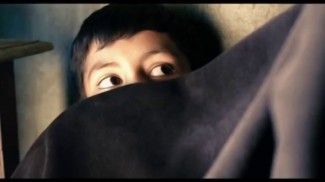God’s Slave (Esclavo de Dios) (Joel Novoa, 2013): Venezuela | Argentina
Reviewed by Daniel Chein. Viewed at SBIFF.
Ever since the 9/11 incident, there has been a lot of buzz in the media around “terrorism” and how the US government should prevent future attacks. And while I’m not denying that terrorists exist or that they commit acts of terrorism, the word has been redefined in a specific and intentional way to evoke fear in the public. To counter terrorism, the US has started wars abroad in the Middle East, violated our own rights at home with the Patriot Act, and imprisoned almost 800 potential “terrorists” at Guantanamo Bay, of which 600 have been released without charges. And it’s no wonder why Hollywood films like Act of Valor (2012), Lone Survivor (2013), or Black Hawk Down (2001) use terrorists as the antagonist: they’re making tons of money off of our fear. Some films do a good job of actually developing the terrorists’ characters–Captain Phillips (2013) comes to mind–but few actually feature the perspective of the terrorist as God’s Slave does.
Directed by Joel Novoa, God’s Slave follows Admed al Hassamah (Mohammed Alkhaldi), a radical Muslim who has ties with an Islamist terrorist organization. As a young child growing up in the Middle East, Admed witnesses his family murdered by Israeli terrorists, and grows up resenting the Jews and dedicates his life to avenging his parents. As a young adult, he studies medicine and moves to Venezuela where he meets the head of a terrorist organization. The leader gives Admed a new identity and him he should live a normal life so as not to arouse any suspicion about his intentions. When it is time, Admed would be called upon to perform his duty and commit an act of terror. But the Israeli’s also have their counter-terrorist organizations that try to prevent terrorist attacks. One Israeli intelligence officer, David (Vando Villamil), has been assigned to derail any terrorist threats against the state. Like Admed, David also witnesses his brother getting blown up by a suicide bomber when he was a boy. Will Admed succeed in carrying out an attack? Or will David be able to stop him?
Based on a true story, the film uses a lot of archival footage to give a sense of realism. The editing is fast and uses a lot of jump cuts, giving the film a very intense feeling. God’s Slave also uses flashbacks of the main characters’ lives to inform the present situation they find themselves in. What I found most interesting about the film is that it really explores the psychological realities of some terrorists (on both sides of the coin), and sheds some light on the religious conflict surrounding Israel today. And while, yes, religious beliefs and extremism does have something to do with the issue, it is not solely defined by the difference of religions. As the title suggests, God’s Slave criticizes those ultra-orthodox Jews and Muslims as they are blinded by their beliefs, losing connection with the human experience. Ultimately, the film fittingly does not have a clear-cut resolution, as the real-life conflict continues to this day.
About this entry
You’re currently reading “God’s Slave (Esclavo de Dios) (Joel Novoa, 2013): Venezuela | Argentina,” an entry on Student Film Reviews
- Published:
- 02.14.14 / 11am
- Category:
- Films, Santa Barbara Film Festival 2014

1 Comment
Jump to comment form | comments rss [?] | trackback uri [?]